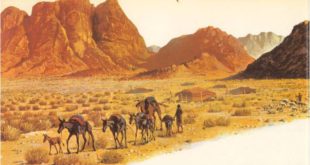For many generations, the ancestors of P’an Keng had considered themselves kings in northern China. Yet this family of kings, the Shang Dynasty, had never governed from a central capital. About 1380 B. C., P’an Keng decided it was time to set up a capital. He found what seemed to be the perfect site at Anyang. Situated near a bend in China’s Yellow River, the fertile plains were ideal for farming and pasture, while the mountains behind it had timber and wild game. Only one thing remained: P’an Keng had to find out if the move was approved by the …
Read More »Tag Archives: Jeremiah
The People of One God 3000 B. C. – 30 B. C.
On the plains of Mesopotamia, a young man stood gazing up at the stars that glittered from the dark sky of night. He was Abraham, a native of the Sumerian city of Ur. Abraham was a Hebrew, one of the many tribes of Semites said to have been descended from Shem, the son of Noah who had been saved from a great flood many years before. Like all people of his time, Abraham believed in many gods throughout nature. As he studied the pattern of the great stars for the god’s message, Abraham began to feel he was in the …
Read More »
